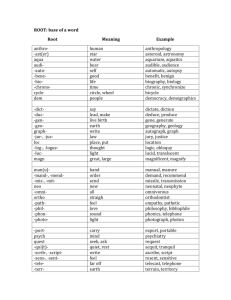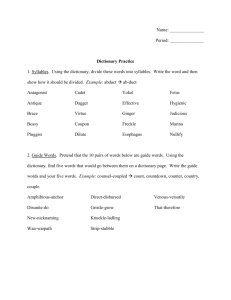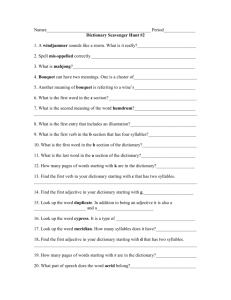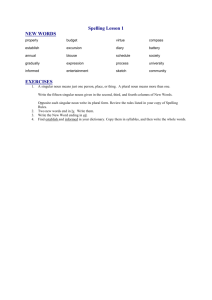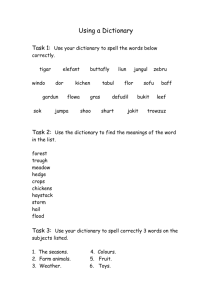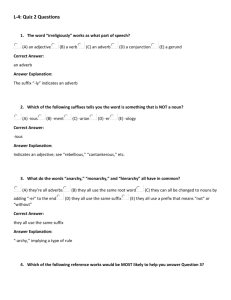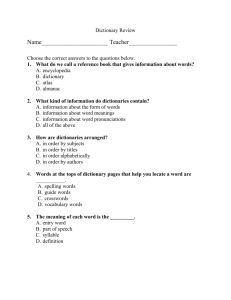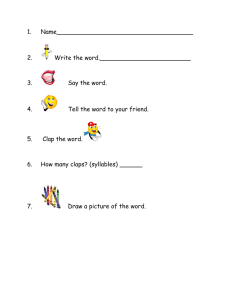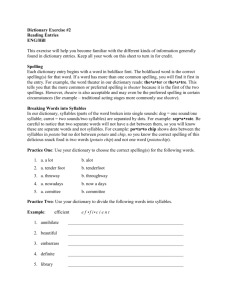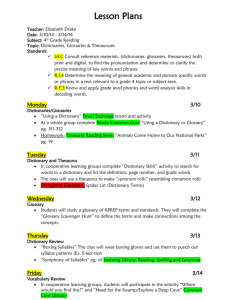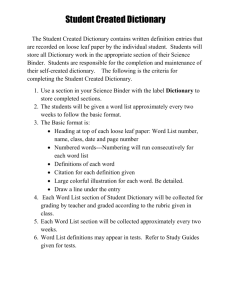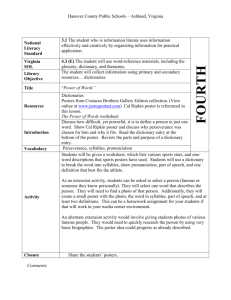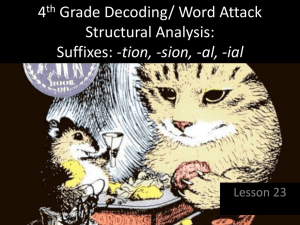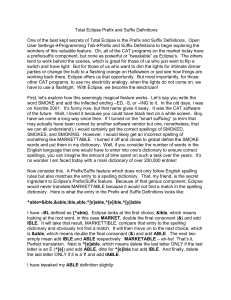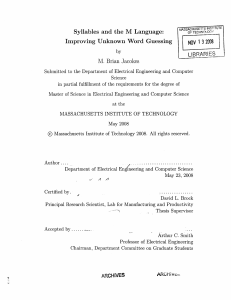Week 2 Reading Word Attack
advertisement
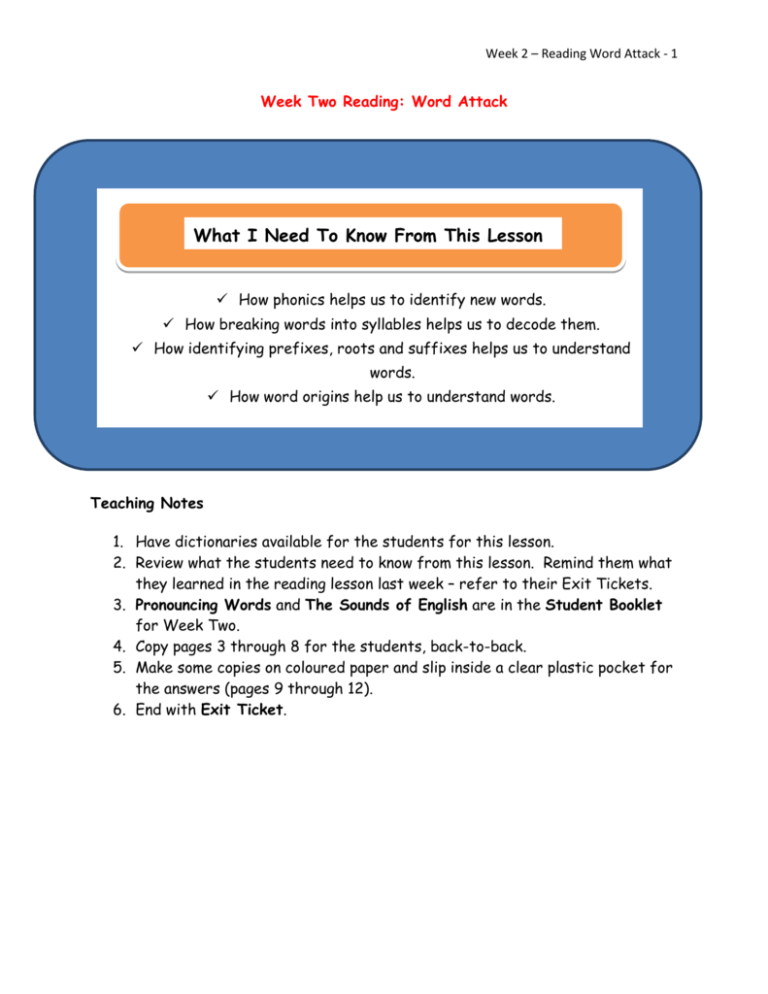
Week 2 – Reading Word Attack - 1 Week Two Reading: Word Attack What I Need To Know From This Lesson How phonics helps us to identify new words. How breaking words into syllables helps us to decode them. How identifying prefixes, roots and suffixes helps us to understand words. How word origins help us to understand words. Teaching Notes 1. Have dictionaries available for the students for this lesson. 2. Review what the students need to know from this lesson. Remind them what they learned in the reading lesson last week – refer to their Exit Tickets. 3. Pronouncing Words and The Sounds of English are in the Student Booklet for Week Two. 4. Copy pages 3 through 8 for the students, back-to-back. 5. Make some copies on coloured paper and slip inside a clear plastic pocket for the answers (pages 9 through 12). 6. End with Exit Ticket. Week 2 – Reading Word Attack - 2 Pronouncing Words When we come across a new word, we have a number of skills to decode the word. 1. Phonics. We use phonics – the sound of the parts of the word. There are 44 individual sounds in the English language, listed in the chart below. 2. Syllables. We break the word into syllables. For example, if we wanted to read the word gastronomy, we would break it into its various sounds: gas-tro-no-my. This makes it easier to read and to spell. 3. Prefix and Root. We break the word into prefix and root. This helps us to deduct the meaning of the word. For example, submarine can be divided into two parts: sub-marine. ‘sub’ means under and ‘marine’ means sea, so we know the word refers to something under the sea. 4. Suffix. Sometimes the suffix helps, as well. For example, if the word was ‘submariner’, the suffix ‘er’ tells us that the word refers to someone or something under the sea. Week 2 – Reading Word Attack - 3 The Sounds of English British spoken English is generally reckoned to use 44 sounds, or ‘phonemes’. Exercise One – Syllabification Mark up these words into syllables and then read them to another student. 1. Epicurean 2. Smorgasbord 3. Intestinal 4. Vegetative 5. Victuals 6. Gastronomy 7. Comestibles 8. Apportion 9. Procurator 10. Necessities Week 2 – Reading Word Attack - 4 Exercise Two – Prefixes Add your own examples to the chart. Use a dictionary to help if necessary. Prefix Meaning My Example Your Example anti against antibiotic opposite antithesis auto self autonomous dis not disincline away disband in not innocent il not illicit im not improbable ir not irresponsible inter between intermarry mis wrong misnomer post after postpone Pre before prejudice pro for proponent forward propel again restart back return re sub under subhuman super above superman trans across transmit un not untrue in reverse unwind Week 2 – Reading Word Attack - 5 Exercise Three – Words with Greek Roots Read the chart below and then think of your own example. Use a dictionary to help if necessary. Greek Root Meaning Modern Word Your Example 1 Graph draw/write Graphite 2 Hept Seven Heptathlon 3 Homo Same homosexual 4 Hyper Above hypertension 5 Lith Stone Neolithic 6 Log thought/word Logic 7 Naut Ship Astronaut 8 Nom Law Astronomy 9 Pan All pandemonium Father Patron 10 Patr Week 2 – Reading Word Attack - 6 Exercise Four – Words with Latin Roots Read the chart below and then think of your own example. Use a dictionary to help if necessary. Latin Root Meaning Modern Word 1 Ambi on both sides ambidextrous 2 Aqua water aquatic 3 Bi two binary 4 Circum around circumnavigate 5 Dict say dictionary 6 Duct lead reduction 7 Loc place local 8 Magni great magnificent 9 Migr wander migrate smaller minus 10 Min Your Example Week 2 – Reading Word Attack - 7 Exercise Five – Words From Other Languages Identify the following words which have come to English from another language. Use a dictionary for those you don’t know. 1. L…………… Comes from the Persian nilak, meaning ‘of a bluish shade’. 2. R…………… Comes from dialect of Italian spoken in Venice, where it originally meant any kind of contest but today refers particularly to yachts. 3. S……………. Probably comes from the tendency of striking workers to damage machinery by throwing shoes into it - sabot being an old French word for a wooden shoe. 4. Z………….... Comes from French or Italian, before that from Arabic, and before that from the Sanskrit word sunya, which meant both ‘nothing’ and ‘desert’. 5. W………….. Comes from the name of a Chinese cooking pan used to cook meat and vegetables at a high temperature. 6. C…………… Comes from a French pastry often enjoyed for breakfast. 7. C…………… Comes from the French name for the art of cooking. 8. T………….. Comes from South America, brought to Europe by the Spanish, this red fruit is common in Italian cooking. 9. H…………… Coined in the USA by migrants from a German city to describe a sandwich with a meat patty. 10. K…………… The German word which means Children’s Garden, and refers to a pre-school or child care centre. Week 2 – Reading Word Attack - 8 Exercise Six – Suffixes Adding -ly to a word usually changes an adjective into an adverb (happy + ly = happily). Adding -ness to a word turns it into a noun (happy + ness = happiness). Add a suffix from the list to each of the following base words. -ability -ion ness -able -less -ous -est -ly -ful -ment 1. Hope…………… 2. State…………… 3. Spite…………… 4. Late…………… 5. Courage…………… 6. Notice…………… 7. Variable…………… 8. Cool…………… 9. High…………… 10. Tense…………… Week 2 – Reading Word Attack - 9 Exercise One – Syllabification - Answers 1. E-pi-cu- re-an 2. Smor-gas-bord 3. In-tes-ti-nal 4. Ve-ge-ta-tive 5. Vic-tu-als 6. Gas-tro-no-my 7. Co-mes-ti-bles 8. Ap-por-tion 9. Pro-cu-ra-tor 10. Ne-ces-si-ties Week 2 – Reading Word Attack - 10 Exercise Two – Prefixes – Possible Answers Prefix Meaning My Example Your Example anti against antibiotic anti-war, opposite antithesis anti-clockwise auto self autonomous automatic, automobile dis not disincline disbelieve, disengage, away disband disconnect dissimilar in not innocent insane, inhuman il not illicit illegal, illogical im not improbable immeasurable, immature ir not irresponsible irresolute, irrelevant inter between intermarry interschool, international mis wrong misnomer mispronounce, misspell post after postpone postscript, postnatal pre before prejudice prehistoric, prenatal pro for proponent propose, protect, project forward propel pronounce, again restart retake, rewrite, reconsider back return revise, redo under subhuman subsist, submit, suborn super above superman supernumery, superstition trans across transmit translate, transport un not untrue uneven, unsteady, undo in reverse unwind untie, unpick, unravel re sub Week 2 – Reading Word Attack - 11 Exercise Three – Words with Greek Roots - Answers Possible answers. Greek Root Meaning Modern Word Your Example 1 Graph draw/write graphite autograph 2 Hept seven heptathlon heptagon 3 4 Homo Hyper same above homosexual hypertension homogenous hyperactive 5 Lith stone neolithic monolith 6 Log thought/word logic dialogue 7 Naut ship astronaut nautical 8 Nom law astronomy nomination 9 Pan all pandemonium pantheon father patron 10 Patr patriarch Week 2 – Reading Word Attack - 12 Exercise Four – Words with Latin Roots - Answers Possible answers. Latin Root Meaning Modern Word 1 Ambi on both sides ambidextrous ambivalent 2 Aqua water aquatic aquarium 3 Bi two binary biceps 4 Circum around circumnavigate circumscribe 5 Dict say dictionary contradict 6 Duct lead reduction deduction 7 Loc place local locality 8 Magni great magnificent magnify 9 Migr wander migrate immigrate smaller minus minimum 10 Min Exercise Five – Words From Other Languages - Answers 1. 2. 3. 4. 5. Lilac. Regatta. Sabotage. Zero. Wok 6. Croissant 7. Cuisine 8. Tomato 9. Hamburger 10. Kindergarten Exercise Six – Suffixes - Answers This is one set of answers; there are more possibilities. 1. 2. 3. 4. 5. Hopeless Statement Spiteful Lately Courageous 6. Noticeable 7. Variability 8. Coolness 9. Highest 10. Tension Your Example

